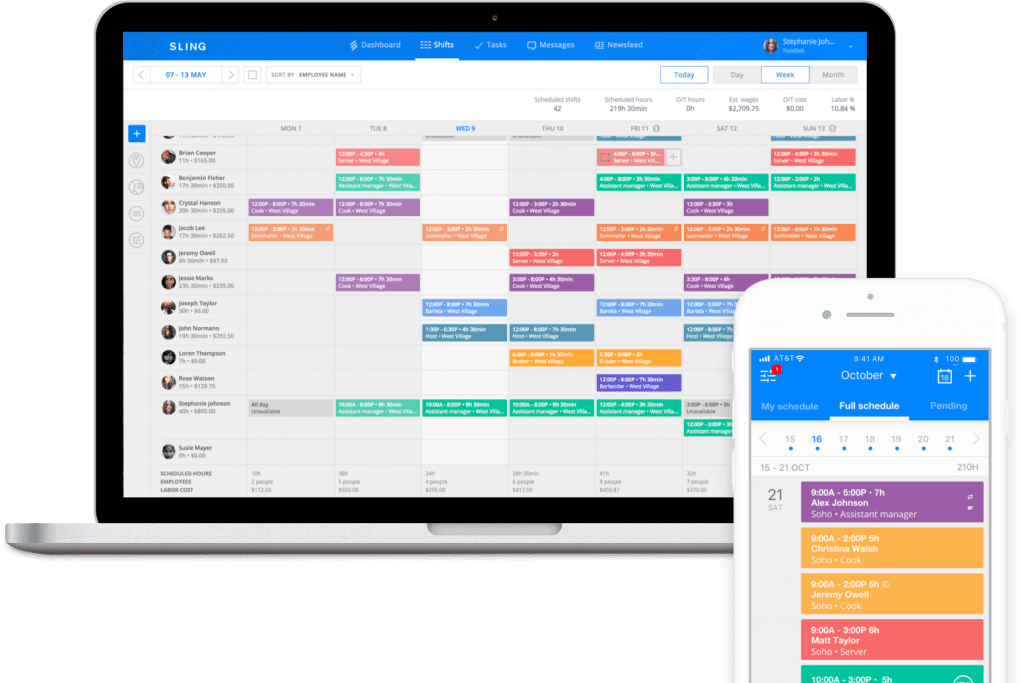Human Resource Planning: Definition, Objectives, And Steps
Human resource planning is an essential part of every successful business. Unfor...

An HR department is common in most businesses, but many still wonder, “What does human resources do?”
It’s a critical question to ask — and, ultimately, to answer — because, while human resources may differ in practice from one business to the next, your particular HR department plays a fundamental role in the successful day-to-day operation of your business.
In this article, the management experts at Sling discuss the question, “What does human resources do?” so you understand the essential part it plays in helping your business run smoothly.

Strategic planning — also known as strategic human resource management or SHRM for short — is a holistic approach to managing your business’s workforce to ensure growth and, ultimately, success.
Strategic planning incorporates many of the activities on this list along with your business goals, vision statement, mission statement, and organizational strategies into a “road map” that guides the way you do business and informs the decisions you make about the future.
An effective human resources department uses strategic planning to analyze the performance of each employee, team, and department and how they’re working together with the other parts of the business.
The HR department then identifies ways that employees, teams, and departments can change in order to improve the way they work and hires employees with the right mix of skills and abilities to make that possible.
For further information on how strategy plays a role in guiding your business, read these articles from Sling:
When examining your own business to identify what human resources does, a key responsibility is recruitment, hiring, and onboarding.
Your HR department will develop their own ways of recruiting, but the most important aspect of these responsibilities is hiring the high-performing employees your business needs to get ahead.
Ideally, your human resources department will separate the wheat from the chaff, so to speak, so that your company hires the right employee for the job.
The hiring process flows naturally into onboarding your new-hires so that they’re prepared to do the job right and feel like they have the tools and knowledge necessary.
Effective onboarding is largely dependent on communication and starts before the new employee even arrives at your place of business. Stay in touch with the new team member in the days leading up to their first day and then ease them into the job.
When you make sure they have what they need in this regard, they (and your business) will be more successful. Your HR department plays a key role in this process.
For more information on welcoming new-hires to your team, take a few minutes to read these articles from Sling:
When you ask yourself, “What does human resources do?”, one of the first things that come to mind is organizing the compensation and benefits side of your business.
These responsibilities are the life-blood of your business, and your HR department functions as a means of communication between management and team members.
In many businesses, it’s the responsibility of the human resources department — in cooperation with upper management — to set wage rates and benefits packages so the company can remain competitive while still attracting high-potential employees.
For more information on the topic of compensation and benefits, take a few minutes to read these helpful articles from Sling:

Maintaining a healthy and positive employee/employer relationship is another key part of human resources.
With a strong relationship between you and your team members, your business will be better able to increase productivity, build employee loyalty, and streamline conflict resolution.
But that relationship is based on a whole host of variables, including:
Your HR department plays a large role in transforming those practices from concept to reality within your business.
For insight into cultivating a healthy employee/employer relationship, take a few minutes to read these helpful articles from Sling:
Labor compliance and taxes are two of the most complicated areas your HR department will have to contend with.
What’s more, many labor laws differ depending on where your business is located. And if you don’t satisfy all the laws and statutes in your area, your business can be hit with monetary penalties and even legal penalties.
That’s why it’s crucial to understand that a major part of HR is ensuring that your team and your company are operating according to the laws where your business operates.
When your business complies with all employment issues put down by your state and local legislature, you won’t have to worry about finding out that you’ve been doing something wrong for as long as you’ve been open.
The best way to maintain all labor law compliance is to consult an attorney versed in your area of business. For more insight into the subject, take a few moments to read these articles from Sling:
Training is more than just preparing new-hires to perform their jobs well. It’s about helping all of your team members improve so they can serve your clients and customers better.
When they’re properly trained, they’ll bring more skill to their responsibilities, they’ll make fewer mistakes, and your business will run like a well-oiled machine.
Keep in mind that training is not a one-and-done thing. Periodic retraining is an effective way to keep your teams at the top of their game.
It’s your HR department’s responsibility to bring to life that on-the-job training — in whatever form it takes in your business — to ensure that every team member receives the information, guidance, and expertise they need to perform at a high level.
There are many ways to train your team. Your human resources department will likely find the ones that work best for your business.
For suggestions and advice on training and building a strong team, check out these articles from Sling:

A big part of the answer to the question, “What does human resources do?” revolves around scheduling, reporting, record keeping, and communication.
For those core activities, nothing streamlines your HR department like the best software. That’s where the Sling app comes in.
Sling is a suite of integrated tools that makes scheduling, tracking labor, finding substitutes, assigning tasks, and keeping everyone informed extremely simple. And that’s just the beginning of what Sling can do.
For an all-in-one solution to help you improve your workforce management and optimization and implement the HR responsibilities mentioned above, incorporate the Sling suite of tools into your workflow.
Features include:
Add to that Sling’s onboard artificial intelligence and you’ve got an extremely powerful and flexible set of tools that will help you streamline your human resources department — not to mention manage your team, increase morale, and improve the way they work.
There are so many ways Sling can help improve your HR department that we don’t have room to talk about them here. So instead of reading about it, why not try it out?
Sign up for a free account and see for yourself how Sling can help you answer the question, “What does human resources do?” for yourself.
For more free resources to help you manage your business better, organize and schedule your team, and track and calculate labor costs, visit GetSling.com today.
See Here For Last Updated Dates: Link
This content is for informational purposes and is not intended as legal, tax, HR, or any other professional advice. Please contact an attorney or other professional for specific advice.
Schedule faster, communicate better, get things done.